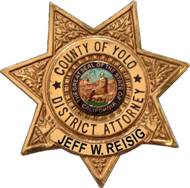| Meeting Schedule |
| Select Weekdays, 6pm - 9pm, 600 A St. |
| Website |
| http://YoloDA.org |
| Affiliation |
| Yolo County District Attorney's Office |
| Purpose |
| Criminal Diversion Program |
Neighborhood Court is a restorative justice program initiated by the Yolo County District Attorney’s office in cooperation with the Davis and UC Davis Police Departments. Neighborhood Court seeks to address nonviolent and low level crimes through community-based solutions to swiftly redress the harm caused by these offenses outside of the traditional criminal justice system. The purpose of this program is to address criminal violations that impact the quality of life in Davis neighborhoods.
| Neighborhood Court is currently recruiting volunteer Panelists and Facilitators. Interested parties should visit the program's website |
About Neighborhood Court
Neighborhood Court utilizes restorative justice concepts which identify crime as acts that cause harm done to people and communities. Neighborhood Court emphasizes the offender repairing that harm done to the individual and the community. Another goal of Neighborhood Court is for all parties to understand the root cause of the crime so that the victim, community and offender can move forward in a positive direction. Neighborhood Court strengthens neighborhoods impacted by criminal activity in four ways:
Restore Victim Neighborhood Court is victim centered by placing emphasis on the victim’s needs. It is focused on offenders making things right to the greatest extent possible with their victims. Offenders pay restitution to victims who have suffered monetary losses or property damage.
Restore Community The Neighborhood Court creates an atmosphere of inclusion and responsibility by providing a direct role for residents to oversee the resolution of offenses in their city. When appropriate the offender will complete community service that goes directly to improving conditions in the area impacted by the crime.
Restore Offender Neighborhood Court offers offenders a second chance by avoiding a criminal conviction on their record upon successful completion of the program. Offenders are also restored by helping them understand the consequence of their actions and by giving them the opportunity to pay back the community they harmed through community service.
Educate Offender Neighborhood Court educates offenders by helping them understand why they committed the offense which led to their current situation. Offenders can be educated in alcohol use, anger management, and how to be considerate to their community, as well as other topics designed to change or modify their behavior.
How it Works
Law enforcement issues an information card to offenders who are believed to commit a qualifying offense (see below) which informs them about the Neighborhood Court program. First time offenders must elect to enter the program voluntarily as an alternative to criminal court. By going to Neighborhood Court, the offender is admitting guilt - the program is not structured like a real court where innocence is determined. Rather, the purpose of the program is to mend the harm caused by the offender.
Once in the program, an offender will have a meeting with a facilitator (a neutral 3rd party mediator) who will explain the program further and prepare the offender for the upcoming conference. In the conference, three panelists (Davis students and residents) will meet with the offender and the facilitator will mediate. The panelists will read the police report and discuss the incident with the offender. The goal of the conference is for the panel and the offender to reach a mutual agreement to make things right. The agreement can include, but is not limited to: community service, restitution, a letter of apology, an educational project or treatment program. By completing the agreement, the DA will not pursue criminal charges and the case will be closed. If an offender fails to complete the agreement in the specified amount of time, the case will be referred back to the DA for filing. Panelists, facilitators, and offenders all sign confidentiality agreements before every conference.
Qualifying Offenses
Common offenses referred to Neighborhood Court include:
- Open Container in Public
- Minor in Possession of Alcohol
- Noise Violations
- Public Urination
- Drunk in Public
- Vandalism
- Petty Theft
As can be expected in a college town, most offenses involve alcohol. (Full list of qualifying offenses here: http://yoloda.org/Files/NHC/PhaseIOffenseList.pdf)
In the Media
AggieTV - Link The Aggie - Links: (4.18.2013) (10.3.2013) Davis Media Access - Link Davis Enterprise - Link The Vanguard - Link
2013-10-03 02:01:51 great stuff —JeffersonChau





Comments:
You must be logged in to comment on this page. Please log in.